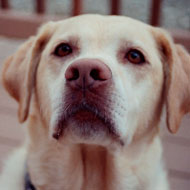Around 11 attacks on guide dogs a month, study finds

In 42 per cent of cases, the attack had a negative impact on the dog's ability to work.
There were around 11 dog attacks on guide dogs every month between 2010 and 2015, a new study has revealed. The attacks are estimated to have cost the Guide Dogs charity more than £650,000 and had a significant impact on the emotional wellbeing of the dogs' handlers.
More than half of the guide dogs attacked were working in harness at the time and, in the majority of cases, the attacking dogs were off the lead. Study authors say attacks could be reduced if owners put their dogs on a lead when there is a working guide dog in the area.
The research was carried out by the Guide Dogs Breeding Centre in Leamington Spa and Professor Gary England from the University of Nottingham. They studied the impact of 629 attacks reported to the Guide Dogs charity between 1 June, 2010 and 28 February, 2015.
Over 40 per cent of the attacks resulted in injury to the dog, most commonly puncture wounds. Veterinary attention was needed for the majority of those with injuries (76.5 per cent). Most often, injuries were to the head and ears, neck or muzzle.
In 42 per cent of cases, the attack had a negative impact on the dog's ability to work, more than a fifth were unable to work for a period of time and 20 dogs were permanently withdrawn.
The cost of these attacks to the charity came to more than £650,000, including veterinary costs and the financial impact of withdrawing 20 dogs.
For the dogs' handlers, the attacks had an effect on their emotional wellbeing in 70.7 per cent of cases; their reactions included feeling anxious, shaken and upset.
Commenting on the significance of the findings, study authors wrote in the Veterinary Record: 'Dog attacks on Guide Dogs' stock impact upon the dogs, the dogs' handlers and the charity financially. The costs to Guide Dogs from dog attacks within this study could have been invested in 13 more guide dogs.
'Additionally the emotional impact on the guide dog owners, both as a result of the attack and in cases where dogs were no longer able to work as guide dogs, is worthy of note…
'It is important to encourage control of pet dogs around guide dogs in order to help reduce the number of attacks occurring'.
The full study can be accessed at: http://veterinaryrecord.bmj.com/content/178/15/367.full?sid=b73616b7-2ae0-4a14-aaa0-4feebfb2ec0f



 The RCVS has announced a new version of its 1CPD mobile app, with enhanced features for veterinary surgeons and veterinary nurses to record their continuing professional development.
The RCVS has announced a new version of its 1CPD mobile app, with enhanced features for veterinary surgeons and veterinary nurses to record their continuing professional development.